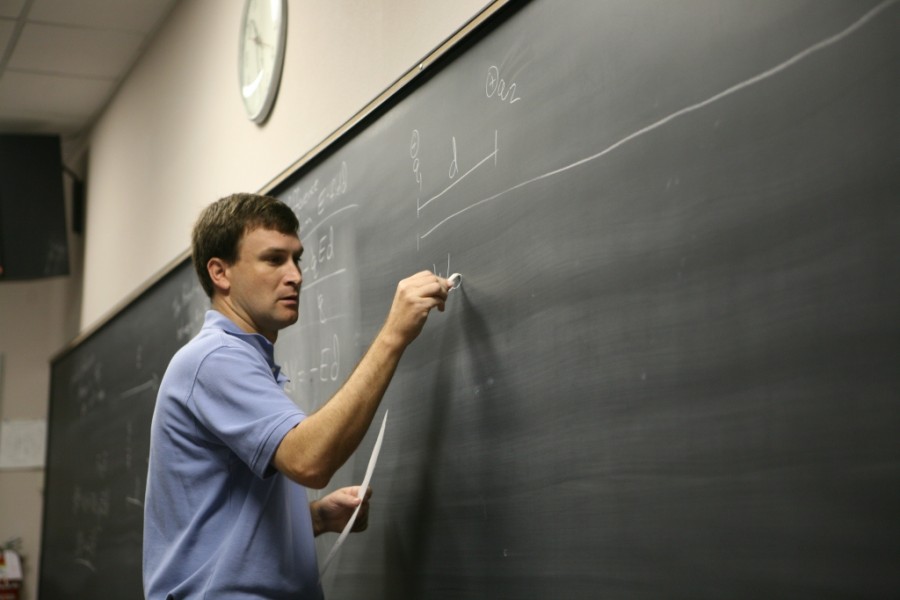Associate Professor of Physics Dr. Derek Jokisch recently received the 2010 Elda E. Anderson Award at the 55th Annual Health Physics Society (HPS) Conference.
The award honors Elda E. Anderson, a physicist who worked on the Manhattan Project and went on to become a pioneer in the field of health physics and a founding member of HPS. The award recognizes the contributions and achievements of an HPS member 40 years old or younger.
Jokisch, a leader of FMU’s own health physics program, was honored to be chosen as the recipient of the same national physics award that his advisor during his own graduate studies had received.
“In some ways, the most intimidating thing about that award is looking at the list of people who have received it,” Jokisch said. “There are so many big names on that list … It’s more than a little intimidating to think that my name is now on that list. It’s a lot to live up to. The thing that helps is that group of past recipients is a very welcoming group.”
According to the HPS website, the award is presented to a young member of the HPS in order to recognize his or her excellence in research or development, discovery or invention, devotion to health physics, and/or significant contributions to the profession itself.
Jokisch was granted the award due to a mix of numerous contributions to the health physics profession: notably, his time spent chairing the Academic Education Committee in the HPS, his work with the health physics program at FMU and his research contributions.
The chair of the Physics and Astronomy Department at FMU, Dr. David Peterson, expressed his thoughts on Jokisch’s achievements.
“It is a great honor that Dr. Jokisch has received this award,” Peterson said. “It is a recognition of his contribution to the profession of Health Physics at the national level, as well as his outstanding work in science education in the Pee Dee. Derek is one of the youngest Full Professors at Francis Marion University, and he is a leader in his department and the university. He has expended a tremendous amount of effort in developing the Health Physics major at FMU, which ranks in the top ten of undergraduate programs in the nation.”
At the conference, Jokisch not only received the Elda E. Anderson Award, but he also participated in two different presentations. One presentation dealt with explaining nuclear science to the media, specifically in relation to that atomic bomb accident at Mars Bluff, and the other focused on external dosimetry, which is more closely related to Jokisch’s main focus of research.
Jokisch earned his bachelor’s degree in nuclear engineering and both his master’s and doctorate in health physics. While majoring in nuclear engineering at the University of Illinois in Urbana-Champaign, he also minored in bioengineering.
“I really liked the biological sciences, so I was taking physiology, biology … I always knew that I was looking for a mix of those sciences,” Jokisch said.
During his time at Illinois, he worked at the campus radiation safety office, which led to his interest in health physics. He made the transition between the two closely related disciplines and moved from undergraduate studies in nuclear engineering at Illinois to graduate studies in health physics at the University of Florida.
Health physics is the profession devoted to radiation safety and protection. It is a multidisciplinary field that incorporates many areas of scientific interest, including physics, biology, chemistry, engineering, ecology, environmental sciences, mathematics and medicine.
FMU’s health physics program has been recently seeing a large increase in student interest.
“We’re the biggest we’ve ever been in the 25 year history of the program,” Jokisch said.
Other faculty members involved with the program include Dr. David Peterson and Dr. Philip Fulmer. Peterson helped found Francis Marion’s health physics program in the early 1980s. Fulmer graduated from Francis Marion as a health physics major in 1989 and went on to earn his doctorate and pursue a plethora of interesting jobs before returning to FMU to teach alongside his former professors.
Francis Marion is currently the only university in South Carolina that offers an undergraduate health physics program.
“It’s a demanding program,” Jokisch said. “It attracts, I think, some of the best students we have on this campus. In some ways, that’s helped it grow. In my opinion, students are attracted to the high standards and high quality. I think that’s one of the reasons that the program has done so well.”
Students are appreciative of the hard work that Jokisch puts into his job.
“Dr. Jokisch is a great professor,” Jonathan Boan, a senior health physics major, said. “He is very helpful, no matter the difficulty of your question … I originally arrived at FMU with my goal set on the dual degree program with Clemson, but Dr. Jokisch informed me of the Health Physics program, and I have no regrets from changing my major.”
The 2011 midyear meeting of the HPS will be in Charleston, S.C. Jokisch plans on attending and hopefully taking some students along for the experience.
